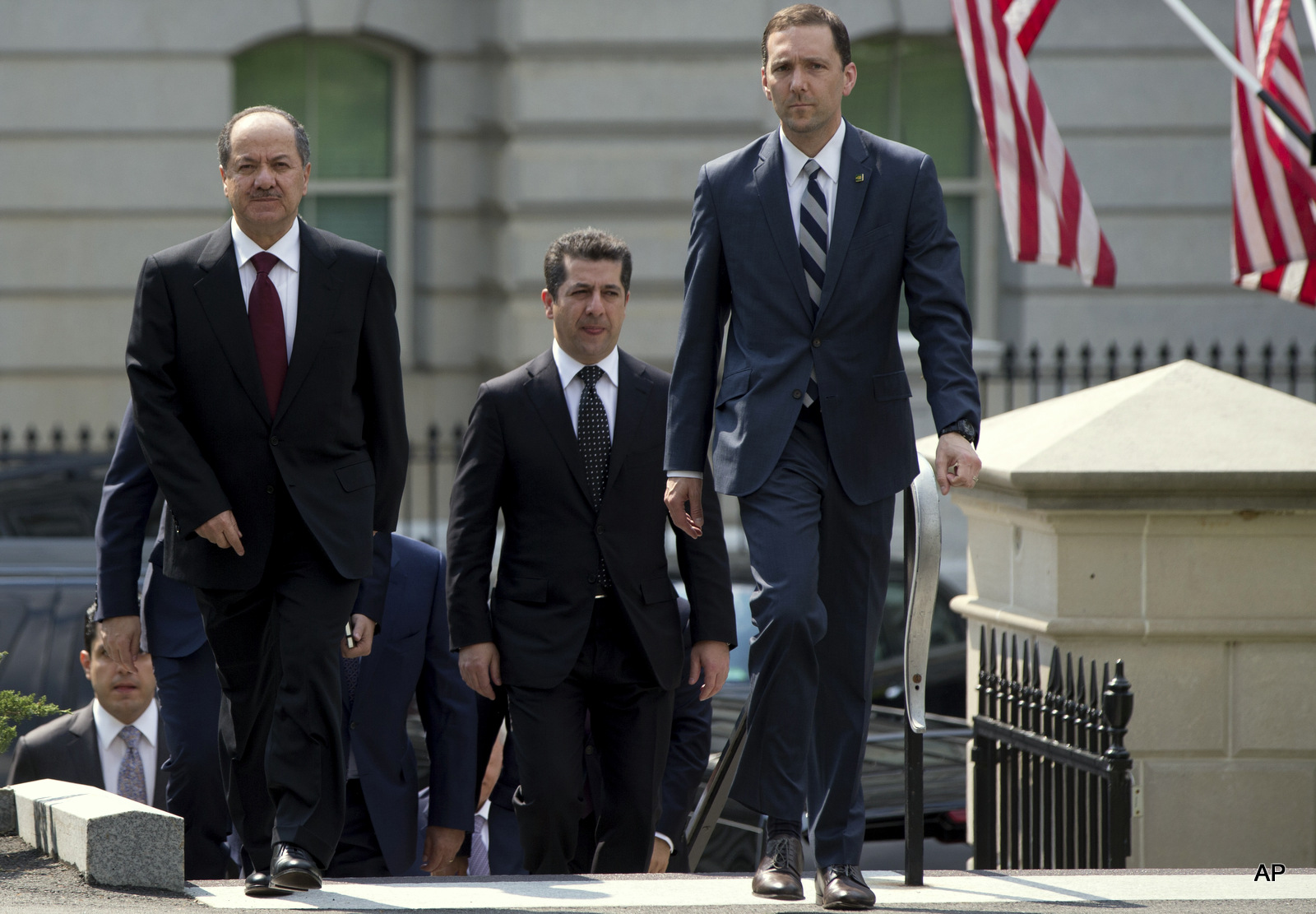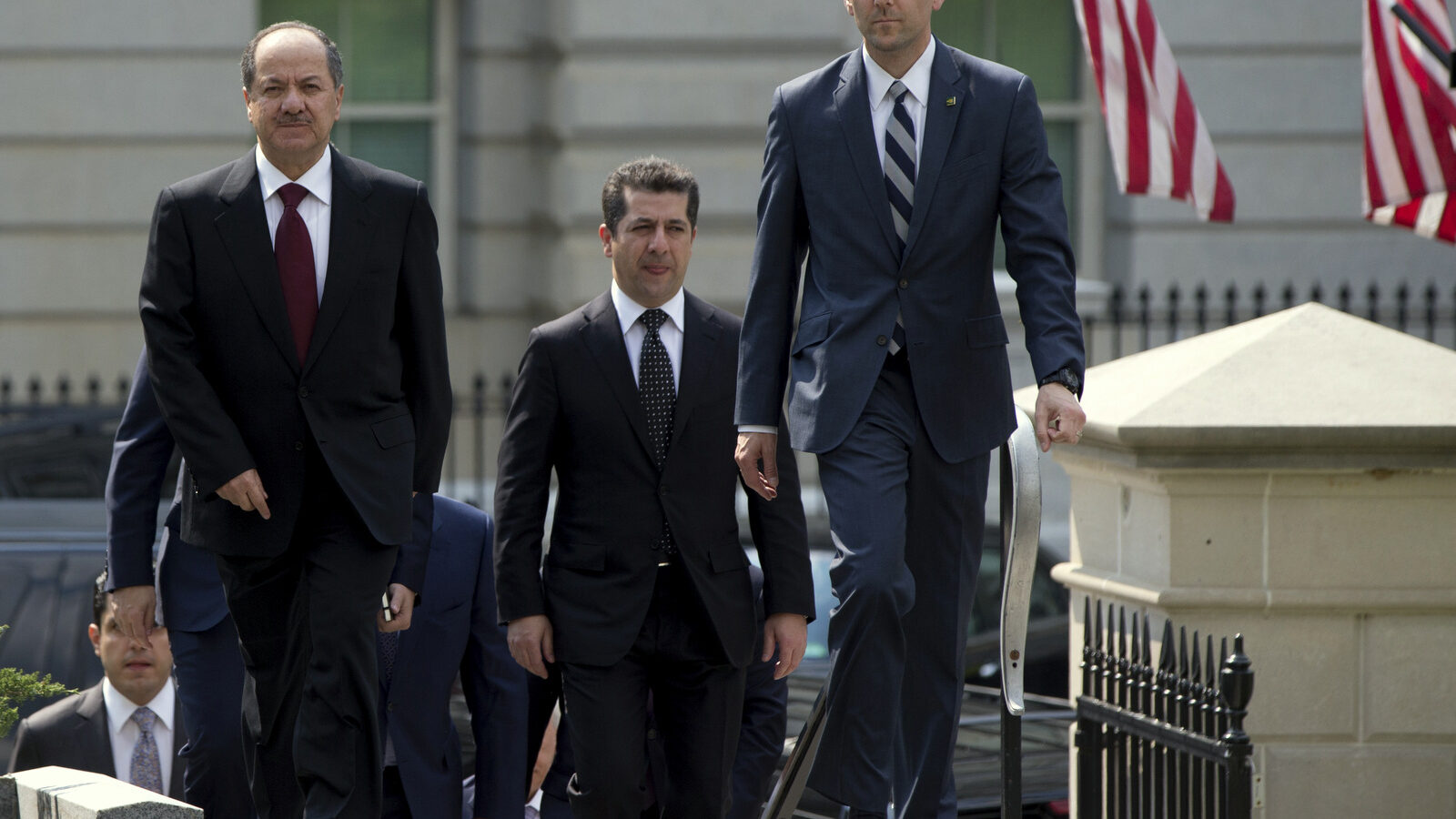 Iraqi Kurdistan Regional President Masoud Barzani, left, walks to West Wing of the White House in Washington, Tuesday, May 5, 2015, where he is scheduled to meet with Vice President Joe Biden.
Iraqi Kurdistan Regional President Masoud Barzani, left, walks to West Wing of the White House in Washington, Tuesday, May 5, 2015, where he is scheduled to meet with Vice President Joe Biden.
WASHINGTON — When Kurdistan President Masoud Barzani reaffirmed in an interview with PBS in March that he would continue to push for secession from Iraq in order to fulfill his people’s national ambitions, many underestimated or failed to grasp the full weight of such a move.
Asked by Jane Arraf whether Kurdistan will pursue its bid for independence, even in the face of the advance of the Islamic State of Iraq and Syria (ISIS) in Iraq, Barzani answered:
“The process is still valid. We’re not going to abandon it. We’re going to do it through dialogue. We will talk with Baghdad about it. We are not going to challenge people. We are not going to fight with them. But, as I said, the process is still valid, and we’re not going to retreat from it. But we need to study. We need to use wisdom. We need to be united. We can’t use force. We cannot shed blood.”
As it turns out, Kurdistan has found a strong patron in the U.S. Department of Defense, which passed a bill in April relating to Kurdistan as a “country.”
Joaquin Flores, an editor and political analyst with the Center for Syncretic Studies, believes Erbil’s secession bid fits within a greater geopolitical plan — the Balkanization of the Middle East.
“Whether regional powers realize it or not, including the Kurds, there has been a clear effort over the past decade or so to break up the Middle East in such a way that America’s main regional ally, Israel, will benefit,” Flores told MintPress News.
“What we see happening in the MENA [Middle East and North Africa] needs to be looked at from a geostrategic standpoint. Just like the Arab Spring was exploited to serve imperialistic agendas, this new wave of nationalism we see rise among ethnic groups has been weaponized to serve Tel Aviv’s neocons’ grand hegemonic ambitions,” he added.
Flores is not alone in asserting that Kurdistan’s calls for independence and America’s apparent support of such ambitions aren’t just another smokescreen. Indeed, it wouldn’t be the first time that democracy-building and counter-terrorism were used as cover stories. This time it could be the U.S. is looking to justify its remapping of the Middle East into a series of pliable, more cooperative states.
Marwa Osman, a political analyst focusing on the Middle East and lecturer at the Lebanese International University in Beirut, told MintPress that the United States is working to engineer a new map of the Middle East, a Sykes-Picot 2.0 of sorts.
“A century after imperial Britain and colonial France divided up the Ottoman Empire we are witnessing a second wave of artificial nation-building. The U.S. is playing cartographer by tapping into ethnic groups’ national ambitions,” Osman noted, alluding to Washington’s preparations for yet another cover story for its covert dealings.
“And while Washington is likely to sell this as a positive move — an expansion of democracy in one of the world’s most unstable regions — playing up nationalism as a means of covert repression will only lead to a flare up in tensions. But then again, it might be exactly the end-game,” she added.
These statements all raise an important question: Why this sudden interest in Kurdistan? After all, the Kurds have been voicing their desire to build an independent state for decades — since about the time of the Treaty of Sevres in 1920, when Iraq was carved out from the Ottoman Empire and the Kurdish people were broken up between modern-day Turkey, Syria and Iraq.
Legislating division
On April 27, Republicans in the House of Representatives proposed to directly underwrite the Kurdish Peshmerga and Sunni irregular forces, rather than aid U.S. partners in the war against ISIS through the Iraqi government nominally controlling them.
Under the text of the National Defense Authorization Act for Fiscal Year 2016 at least $178 million and up to $429 million would flow directly — meaning, without Baghdad’s oversight — to “Kurdish and tribal security forces or other local security forces with a national security mission.”
While it could certainly be argued that the bill only aims to streamline military aid by ensuring speedy delivery to areas most affected by or facing the greatest threat of ISIS advances in Iraq, the DOD is essentially asserting Erbil’s independence from Baghdad in a move which stands to drive a wedge between U.S. and Iraqi officials.
Those military forces, according to the House Armed Services Committee’s synopsis of the 500-page text, would “be deemed a country.” Not only is this bill unusual in that it denies Iraq territorial sovereignty by generating a legislative vacuum vis a vis Kurdistan’s status, the text also provisions for Baghdad to end “support to Shia militias” in order to qualify for military aid.
Since those “Shia militias” have been instrumental in pushing back ISIS and reclaiming some territories formerly under its sway, such a condition strikes some as puzzling. Still, others aren’t surprised at all.
Mohsen Kia, a senior Middle East analyst for Iran’s ABNA news agency, says the devil lies in the details when it comes to this bill. “The DOD is not only unilaterally asserting Kurdistan as an independent country, it is profiling U.S. military aid along ethnic lines in a region already wrecked by sectarianism and ethnic-based violence,” Kia told MintPress.
He added:
“The U.S. is not just playing one country against another — here, Kurdistan against Iraq — it is pitting people and religious groups against one another rather than promote cooperation against radicalism. Clearly the goal here is to further fracture and divide Iraq. ISIS has been but a tool of such division in the hands of Washington hawks, just as this so-called military aid package is.”
A marriage made in geopolitical heaven
For now the White House has declared it would veto the bill and call for a “change in language.” Speaking at a media briefing in late April, Marie Harf, the State Department spokeswoman, told reporters:
“We’ve always said a unified Iraq is stronger, and it’s important to the stability of the region as well. Our military assistance and equipment deliveries, our policy remains the same there as well, that all arms transfers must be coordinated via the sovereign central government of Iraq. We believe this policy is the most effective way to support the coalition’s efforts.”
“How long this narrative will hold is open to debate,” Stephen Lendman, acclaimed investigative journalist, author and radio show host, told MintPress. “When it comes to mass and grand deception, Washington is king,” he added.
But here is where Washington’s policy might stick and Baghdad’s ire rise. The White House wants the language of the bill to be addressed, not necessarily its implications. “So we look forward to working with Congress on language that we could support on this important issue,” Harf noted on April 30.
As far as Lendman is concerned, Washington is getting ready to abandon its “ally,” Baghdad, to serve its new, pro-Erbil policy in the region. He told MintPress:
“Strategically speaking, the Kurds have proven to be overwhelmingly pro-American, in contrast to Iraq’s rising anti-American sentiments. Erbil could prove a far more pliable ally than Baghdad ever was or ever could. After the two have a long history together. This would not be the first time the U.S. is playing the Kurdish cards.”
Indeed, historian and academic Bryan Gibson told Rudaw, a Kurdish media network, in an interview in April that the U.S. was more supportive of the Kurd forces in their 1970s battles with Baghdad than was previously thought, hinting that Erbil and Washington share a real connection.
“From 1958-75, U.S. foreign policy in Iraq was designed to prevent it becoming a Soviet satellite. This led to a series of covert operations to support groups inside Iraq that were opposed to Moscow’s imperial designs, like the Baath Party in the early 1960s and the Kurds in the 1970s,” Gibson said.
Yet this friendship did not prevent the U.S. from deserting its Kurdish friends in 1975, when Saddam Hussein stroke a peace deal with the Shah of Iran.
A few decades have passed, and the Kurds have risen again as a tactical ally against both Iranian influence in the Middle East and ISIS.
Proof of this marriage made in geopolitical heaven can also be seen in Erbil’s aggressive hiring of former U.S. military. Ex-U.S. troops are being recruited by the Kurds to join the Peshmerga by signing up via an online application. According to The Daily Beast, the website is part of a larger recruiting program called the Kurdish Peshmerga foreigner registration assessment management and extraction program, or F.R.A.M.E.
“Engineered chaos”
Even if the DOD feels somewhat entitled when it comes to redefining and redrawing the map of the Middle East, playing cartography to the tune of its policies, not everyone in the region will welcome the idea of an independent Kurdistan.
Erbil’s wishes will find stiff opposition in both Baghdad and Ankara, not to mention Tehran and Damascus, which all are home to large Kurdish communities. Depending on how geographically comprehensive this new Kurdistan will ambition to be, Turkey, Syria, Iraq and Iran all stand to lose significant swathes of land. Governments are likely to strongly object to such a loss, especially when those territories happen to be sitting on vast natural resources reserves of commodities like oil and gas.
Meanwhile, beyond the obvious political uproar a free and independent Kurdistan will generate, lies the matter of foreign alliances. Should the U.S. support Kurdistan’s secession bid, Washington stands to anger and lose regional tactical allies in its battle against terror — Iran and Turkey, in particular.
“The U.S. is playing a dangerous balancing game here. Washington is collaborating with Iran in Iraq against ISIS, while playing Baghdad — an ally of Tehran — against Erbil and Turkey, an ally in Syria against Kurdistan in Iraq. This overlapping and backstabbing cannot be sustained without repercussions,” Marwa Osman, the political analyst and lecturer, said.
“Eventually this house of cards will come tumbling down. What I am really worried about is the mess which will be left behind,” she added.
But what if “this mess,” as Osman calls it, is actually by design? Justin Raimondo, an editor for Antiwar.org, wrote in June 2014:
“Iraq’s fate was sealed from the moment we invaded: it has no future as a unitary state … Iraq is fated to split apart into at least three separate states…This was the War Party’s real if unexpressed goal from the very beginning: the atomization of Iraq, and indeed the entire Middle East. Their goal, in short, was chaos – and that is precisely what we are seeing today.”
Echoing analyst Joaquin Flores’ comments on the breaking up of the Middle East as being part of an Israeli agenda, Oded Yinon’s ominous 1982 article, “A Strategy for Israel in the Nineteen Eighties,” comes to mind.
Yinon believed that Israel’s survival required that the Jewish state become a imperial regional power that “must effect the division of the whole area into small states by the dissolution of all existing Arab states … The Zionist hope is that sectarian-based states become Israel’s satellites and, ironically, its source of moral legitimation.”
And now the Middle East is dissolving under the weight of hyper-sectarianism and radicalism — a situation Stephen Lendman describes as “engineered chaos.”


